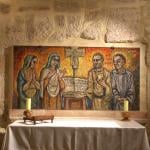On p. 1215, Tom has an interesting way of contrasting the rhetorical thrust of Galatians as opposed to Romans. He puts it this way: “The difference between the two epistles is this. In Galatians, Paul is warning Gentile believers that they must not try to become physically, ethnically, Jews. To do so would undermine that single family by insisting on an ethnic basis. In Romans he is warning Gentile believers that they must not imagine that God cannot and will not bring more and more Jews back into what is, after all, their own proper family. That too would be to insist on an ethnic basis, only now a non-Jewish one rather than a Jewish one.” This I think is basically right. What Tom does not add is that this family he is referring to is Jew and Gentile united in Christ, and that it is through Christ alone that Jews and Gentiles are now united with Abraham and the promises to Abraham. And this is a crucial point, because it is the Christology of Paul, precisely, which prevents him from see Christ as now Israel. Christ is the messiah of Israel, and the savior of Gentiles and as such he unites the two in himself— not in Israel. Gal. 3.28 is quite clear about this. So, when Paul argues in Romans 11 that Gentiles have been grafted into the tree or the root, or the like, he is not thinking that Gentiles have been grafted directly into Israel, which by and large is not in Christ. They have been grafted into a new entity, and so it is only indirectly, through Christ they are connected to the Abrahamic heritage, and it is only indirectly, through their fellow Jewish Christians that they have a more present and proximate connection to Judaism itself. These Gentiles believes are not Jews, not even the true Jews. Those, in Paul’s view are simply the Jewish believers in Jesus. These sorts of distinctions are important to understand the delicate balance Paul maintains. On the one hand he wants to affirm the new creation, and new community in Christ. On the other hand, he does not want to suggest either that this community has replaced Israel, or left it behind. What he does thing is that now in part, and later more fully, Israel is being enfolded into the new eschatological community of God and of his Christ.
Tom suggests on pp. 1216-17 that Jerm. 11 stands in the background in Romans 11, because there too we hear about an olive tree, namely the people of God, which is facing judgment, or at least heavy weather due to its fruitless condition. He may be right about this, since in both cases branches are destroyed when they are fruitless.
pp. 1218-19 raises the interesting question of whether it is right to suggest Paul is reading the Gentile’s into Abraham’s and Israel’s story? Were he doing that, we could imagine he might be talking about something like Esau returning to the fold, or the nations coming to Zion or the like. But that is not the subject here. Gentiles are not any direct part of Israel’s story in the past, the question is, do they have a right to claim that story as THEIR past story? Paul doesn’t really suggest they do. The wild olive branches do not become naturalized branches just because they believe in the Jewish messiah. They remain wild olive branches. It would be more nearly correct to say that these Gentiles have been grafted in Christ unto the Jewish Christians whose story has a new development because of that engrafting.
It must also be said that all this talk about breaking off branches from the people of God, and grafting others in, and even warning that the newly grafted in ones could be broken off due to subsequent unfaith (they only stand by faith says Paul) makes as clear as it could be that Paul believes apostasy of true believers is a danger, and warns against it. His concept of election here is that there is an elect tree, so to say, and that individuals are only elect so far as they abide in the tree by faith. That’s all. He is not talking about elect individuals that have eternal security guaranteed in advance. He just isn’t otherwise there would not be any point in warning ALL the audience of the dangers of being pruned out of the people of God. Calvinism this is not, rather it is form of early Jewish theology that takes seriously both God’s saving plan and power and the necessity of a free human response in faith.
I agree with Tom’s point on p. 1221 when he says “For Paul, the irony would not be lost on him if he could listen to our late-modern, post-modern, or even post-liberal debates– the real anti-Jewish position would be the opposite: the suggestion that the messianic death and resurrection of Jesus and his world wide rule as Kyrios should be seen as a fine religious option for gentiles but off limits for Jews; the suggestion in other words that Jews are ‘alright as they are’ and should not under any circumstances be presented with the ancient messianic claim that Jesus’ followers made, and still make, on the basis of nothing more or less than his resurrection from the dead.”
Then however we descend into caricature, I’m afraid. Tom says the olive tree metaphor militates against the suggestion that Paul is here speaking of a “large scale or last minute re-entry of Jews by a kind of automatic divine fiat”. Who exactly was arguing that he was? Paul says in Rom. 11.25 that all Israel will be saved in like manner to which the Gentiles were– by grace through faith in Jesus. Then, equally unhelpfully, Tom suggests that if we just postpone the conversion of the Jews to the eschaton this would hardly be seen as a fit warning to Gentiles in Rome in the present. But of course it’s not an either or matter is it? It’s a both/and situation. Paul is arguing some Jews are being saved now, and later a bunch more will be saved when Jesus comes back, so Gentiles better get used to having Jewish Christian brothers and sisters forever, and in the between they had better watch their own beliefs and behaviors or they may find themselves on the outside looking in. Tom is right (p. 1222) that it makes no sense for Paul to say that no Jews will come to faith until the parousia. But no one I know of is suggesting he is. He is arguing that some are coming in now, and many more later, so Gentiles better get used to it.
The discussion on pp. 1223ff. of the remnant concept in 11.1-10 (yes Tom is back tracking due to his chiasm) is interesting. Who is the righteous remnant now, is the proper question, and Paul’s answer seems to be Jewish Christians. Notice that he is not arguing the righteous remnant of Israel is both Jew and Gentile united in Christ. Tom is correct that Paul’s idea of remnant then differs dramatically to that at Qumran which refers to a small group of Torah true Jews who are ultra observant of the Mosaic Law, while Paul is talking about a growing remnant of Jews committing themselves to Jesus (and I would add to the law of Christ).












